Graham Storrs's Blog, page 12
November 29, 2012
Why Readers Make Me Write – Guest post by A.M. Harte

I know Anna Harte can write, and I know she’s been extremely generous and supportive of my own writing, that’s why I’m very pleased she chose my blog as the final destination on her Above Ground Blog Tour to help launch her first novel. Details of the book, the author and where to find copies are to be found at the bottom of the page. Also, if you’ve been part of the mystery prize giveaway (or want to see who got what) the widget at the very end could be your gateway to happiness. Meanwhile, let me say once again what an honour it is to be able to play a part in the Above Ground launch. Releasing your first book is a very special thing for a writer’s and it is great to be involved in such an important event. And now, I’ll shut up and let Anna talk…
Why Readers Make Me Write
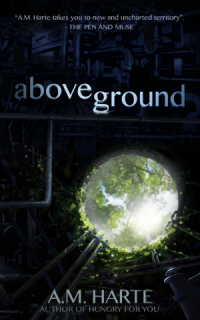 I can’t remember how I first came across Graham Storrs.
I can’t remember how I first came across Graham Storrs.
Was it through mutual author friends? Twitter? One of the numerous writing communities, or random chance?
All I know is that Graham is one of the few indie authors I (somewhat!) know whose work blew me away. I read TimeSplash and thought: Woah. Then I thought: I want to write something like this.
Throughout this past month, I’ve been running a blog tour to celebrate the release of my first novel, Above Ground. I’ve looked at how, where, and what to write, but I haven’t stopped to think about WHY.
Certainly authors like Graham – authors whose work captures my imagination – play their part in making me want to write.
But it’s more than that.
The truth is that I can’t imagine not writing.
If I go for a long stretch without writing, I get restless, anxious and irritable. It’s akin to cabin fever, trapped in my head with characters stepping on my toes. I feel unproductive and incomplete.
So why do I write? Simply to avoid being unhappy and/or going insane?
Of course not.
Writing also fills me with a terrible excitement. It’s all-consuming and empowering. No other activity fulfils me even half as much, and there is a (perhaps egotistical!) delight in seeing one’s thoughts come into being.
But the most important reason behind my writing – what made me transition from a writer scribbling stories to myself into an author willing to release her work into the public – is the joy of sharing.
My readers are the reason I write.
Without the support of my readers, Above Ground would have never made it to where it is today. They’ve encouraged me and had the utmost patience with my less-than-speedy output, and the only way I can repay their trust is to keep on writing.
My readers are the reason I write.
I’m a voracious reader myself. I know what it means to dedicate time to an author, to believe in their work and nudge them for sequels. To think that someone could feel the same way about my work is, quite simply, awesome.
My readers are the reason I write.
Ever since I read TimeSplash, I’ve been (gently) pestering Graham for a sequel. It is my sincerest hope that, with Above Ground, I can capture reader imagination in the same way.
Above Ground
The first glimpse of sun may be her last.
When Lilith Gray goes above ground for the first time, she hardly expects to stay there — much less be trapped on the surface with no way home.
Hunted by trackers and threatened by the infected, Lilith is on the run, desperate to return underground. Her only hope for survival lies with a taciturn werewolf with a dark agenda of his own.
Lilith’s old carefree life has been reduced to one choice:
Adapt. Or die trying.
Find Above Ground on Amazon and Goodreads
Kindle US – http://www.amazon.com/dp/B009YA879S
Kindle UK – http://www.amazon.co.uk/dp/B009YA879S
Goodreads – http://www.goodreads.com/book/show/16090171-above-ground A.M. Harte writes twisted speculative fiction, such as the post-apocalyptic Above Ground and the zombie love anthology Hungry For You. She is excellent at missing deadlines, has long forgotten what ‘free time’ means, and is utterly addicted to chocolate. She lives in London, a city not half as foggy as some seem to think.
A.M. Harte writes twisted speculative fiction, such as the post-apocalyptic Above Ground and the zombie love anthology Hungry For You. She is excellent at missing deadlines, has long forgotten what ‘free time’ means, and is utterly addicted to chocolate. She lives in London, a city not half as foggy as some seem to think.
November 15, 2012
Review: Outlaw Bodies
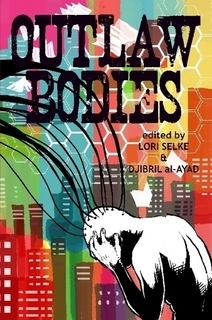 [This review first appeared in the New York Journal of Books.]
[This review first appeared in the New York Journal of Books.]
Some publishers, while not necessarily better than others, are certainly different. The Future Fire publishes an online magazine of speculative fiction with a bit more focus on social issues and a bit more political awareness than you see in most sci-fi and fantasy mags. That’s why when they bring out an anthology with the title Outlaw Bodies you might expect it to be just a little more interesting than the run-of-the-mill.
As Lori Selke promises in her introduction, “In this anthology, you will find artists, mothers, and academics; bodies constructed of flesh and of bone, of paper and metal and plastic. Bodies formed of bouncing, buzzing electrons, waves and particles of light. Bodies grown and bodies sewn, glued, folded and sutured. And all of them standing in defiance of the rules and regulations designed to bind them.”
And that’s exactly what we get.
Jo Thomas, in “Good Form,” handles the relationship between a new-made android and its test engineer; Vylar Kaftan no doubt touches a nerve with many parents in “She Called Me Baby,” in which a young woman pursues a determined series of body modifications that make navel piercing seem tame—all in the name of being different from her mother.
Anna Caro’s “Millie” is a touching coming-of-age story of a girl with severe disability, except this is set in a future where such things are not quite the impediment to a normal life they once were.
And that’s just the first three stories.
If you’re a teenage misfit who finds happiness on the surface of a poisonous post-apocalyptic Earth; if you’re a man, unsure of himself in a world where men won the battle of the sexes, who finds comfort in a paper wife; even if you are Frankenstein’s monster, dealing with the modern health system as your stitches unravel, your proper place is in this anthology.
Yet the anthology is not all about misfits and freaks.
Portuguese writer and academic Fabio Fernandes gives us a story about connected and unconnected identity in a world of ubiquitous networks. Science fiction fans will love the embedded references.
In fact, all the stories in this anthology have something to interest or delight, taking the theme into all kinds of fascinating worlds and situations, and the quality is solid, rising to high in places . . . except in one single case.
Right at the centre of this anthology is a story so glaringly out of place as to make you wonder what the editors could possibly have meant by including it. “Mouth,” by M. Svairini, is pornography, a simple piece of BDSM fantasy set in a ludicrously improbable future in which the protagonist, a genetically modified passive, attends a small orgy. The “story” is a sequence of set pieces in which different members of the cast couple with one another in unusual ways. There is no characterization, certainly no character development, the barest minimum of plot, and, unless you’re into BDSM, the relentless progression of sex variations rapidly becomes boring. It has all the quality of a low-budget porn movie.
Considering how good many of the other pieces in this anthology are, the inclusion of this one is a jarringly odd choice. It does a great disservice to the other authors to have this piece alongside their work.
“Mouth” aside, Outlaw Bodies is a fine sci-fi/fantasy anthology from The Future Fire with a most readable standard of contribution and one or two quite excellent stories.
November 13, 2012
Five Books That Changed My Life?
Indie author Bryant Delafosse tagged me with one of those meme things. Well I think those meme things are evil and usually I don’t play. But, since I’m embarrassingly flattered to be tagged, and as I have been neglecting my bloggerly duties of late, I’m going to give this one a go.
The idea is to give a list of five books that have inspired me as a writer and then to recommend five bloggers “who refuse to live in the real world”. The first part is stupendously difficult – after all, it’s asking a lot of a book to change your life, and, if there were any that did, I probably read them between the ages of 6 and 10 and I’ve forgotten what they were. I can think of hundreds of writers I love to pieces, but that’s not quite the same thing, is it? The second part is dead easy. I just have to nominate anyone in the publishing world.
Oh well, let’s get that hard part out of the way.
The Martian Chronicles by Ray Bradbury. It’s hard to think of a writer who has had more of an influence on the way I view writing than the late lamented Mr. B, and hard to think of a book that opened my eyes so much to what great writing could be than The Martian Chronicles. I read this one when I was very young and it blew me away. I was in a daze for weeks. The stark beauty of Mars, the heartbreaking pathos of its dying natives, the casual cruelty, hubris and stupidity of the human settlers, were all enough to make it an outstanding book, but what hit me right between the eyes back then was that Bradbury’s Mars wasn’t a real place at all and yet I knew it and all its people.
Brave New World by Aldous Huxley. I read this when I was in my mid teens and it stands out for two reasons. Firstly, Aldous Huxley. I just loved the way he wrote. It was a style so clear, so accurate, so unpretentious, that I realised a writer could produce great literature without devolving into indecipherable “poetry”. Most people (including most publishers) seem to think that “beautiful writing” consists of overblown metaphor, steeped overnight in convoluted prose, and served on a bed of nonsensical profundity. In Huxley, I found a brilliant mind revealing its lovely thoughts in prose as fine and clear as morning sunlight. Secondly, although I’d read some excellent science fiction by then and all the best sci-fi grapples with difficult ideas, I was immensely impressed by the craft and delicacy with which Huxley laid it all bare for us.
Pincher Martin by William Golding. Another book from my teenage years. I’d like to paint a picture of myself at, say, 15. Cocksure, arrogant, pretty enough to attract the girls, stupid and selfish enough to be a huge disappointment to any who took the bait. I was always the smartest person in the room and I thought the future was mine for the taking. I supposed I might like to be a writer one day and everyone around me was impressed with my skill. Pincher Martin came into my life at just the right moment. I read it with a mounting sense of fear and finished it shaken to the core. To write a novel that good was so far beyond my abilities that even I could see it. There have been other pieces of writing since then that have had the same humbling – nay, crushing – effect (Under Milk Wood by Dylan Thomas springs to mind, Spies by Michael Frayn was the most recent) but Pincher Martin was the first.
I, Robot by Isaac Asimov. I can’t remember when I became an Asimov fan. I suppose I had been reading the short stories since the year dot. The Foundation Trilogy was a wonder to me but it wasn’t until I found I, Robot that he satisfied me intellectually as well as tickling my sensawunda. It was the beginning of my love affair with artificial intelligence (which, in later life, influenced the choice of my research and career direction) and it was the first instance of a crush on a book character I can recall (Dr. Susan Calvin, of course!). I loved all of Azimov’s robot stories (especially The Caves of Steel). In my own fiction, I have a favourite robot character who owes a lot to this early influence.
On the Origin of Species by Means of Natural Selection, or the Preservation of Favoured Races in the Struggle for Life by Charles Darwin. I came to this book relatively late in life when I already understood the topic thoroughly and had already read everything I could get my hands on by Richard Dawkins (an extremely good writer by the way), so I read it mostly out of curiosity to see what it was like. And what was it like? It was simply the best piece of science writing I have ever read (and I have read a lot). It was the most complete, coherent and exhaustive single piece of argumentation I have come across. Darwin’s intellect is magnificent, the breadth of his knowledge is astonishing, his devotion to evidence and experimentation is exemplary, and the clarity of expression he brings to the task of explaining this beautiful idea is amazing. Darwin is now my hero and this book is his greatest triumph – one of the greatest triumphs of our species.
So, no great surprises there then. Time for part two. I hereby nominate the following to continue the good work:
Emma Newman: http://www.enewman.co.uk/
Djibril al Ayad: http://djibrilalayad.blogspot.co.uk/
George Angus: http://www.tumblemoose.com/
Stephen Saus: http://stevensaus.com/
Carrie Cuinn: http://carriecuinn.com/
November 1, 2012
Guest Post – Advance Warning
At the very end of this month, I’ll be posting a guest post from author Anna Harte as part of her “Above Ground” blog tour – to help launch her new book called, er, “Above Ground”. I thought you might like to know that the tour starts today (1 Nov) and runs throughout the month, and that there are prizes. Check out the schedule and enjoy the tour. And here’s a widget that will tell you how to win those prizes.
a Rafflecopter giveaway
October 29, 2012
Bias at the BBC is Just Responsible Journalism
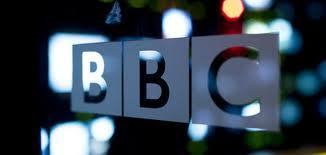 I read a piece in The Register today about a court case underway in the UK between some old Welsh bloke and the BBC. He’s suing them because he wants to know who was at an internal BBC meeting, held six years ago, about climate change. I don’t care too much about that. Even old Welsh blokes are entitled to their opinions and, Lord love ‘em, they’re even entitled to waste the British taxpayer’s time and money pursuing stupid court cases if they so wish. What upset me was the tone of the piece in The Register, which seems to take the side of the litigant in asserting that the BBC held a secret meeting where it decided to “abandon partiality” in climate change reporting.
I read a piece in The Register today about a court case underway in the UK between some old Welsh bloke and the BBC. He’s suing them because he wants to know who was at an internal BBC meeting, held six years ago, about climate change. I don’t care too much about that. Even old Welsh blokes are entitled to their opinions and, Lord love ‘em, they’re even entitled to waste the British taxpayer’s time and money pursuing stupid court cases if they so wish. What upset me was the tone of the piece in The Register, which seems to take the side of the litigant in asserting that the BBC held a secret meeting where it decided to “abandon partiality” in climate change reporting.
Much as I usually enjoy The Register, this particular piece seems rather biased and quite misleading, I’m afraid. The BBC did not choose to “abandon impartiality” on climate change but took the decision to accept the overwhelming scientific consensus on the subject and not present a spurious impartiality by offering extremist minority views to make reports look “balanced”. Every time a report is made on evolution, we don’t expect to see a crank Muslim or Christian fundamentalist quoted as saying it’s all rubbish. Every time we hear about a deep space mission, we don’t expect to hear from a conspiracy theorist to tell us it’s all a fraud. Why then should we expect every item on climate change to be “balanced” by a crank denialist who doesn’t “believe” in the science?
Instead of implying the BBC is at fault for “abandoning impartiality” the author should be praising the BBC for responsibility and accuracy in its reporting of the true state of the climate “debate”. That is, there is no debate. 98% of climate scientists are in perfect agreement that people are causing climate change – a level of agreement that would be the envy of many other scientific fields.
If other major news organisations had adopted the same responsible attitude to climate change, we would have seen far fewer cranks being given airtime and column inches and far better decision-making from our politicians. Some news organisations have shamelessly leapt on the spurious “impartiality” of presenting views contrary to the scientific consensus – however flawed or ill-informed – so as to further their own agenda of attempting to prevent government action (particularly new legislation) on the matter.
I say we should all be congratulating the BBC on an unusually principled stand for good reporting in the teeth of powerful opposition.
October 26, 2012
Evolution and Space
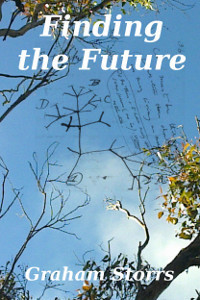 I have a new short story out as a “single” on Amazon. It’s called “Finding the Future” and it’s priced at $0.99c for those on a low budget. For pensioners, concession card holders and people who wouldn’t spit in my mouth if my teeth were on fire, you can actually get the story for free online where it was first published, in the newly relaunched Scareship Magazine (Issue #7, Sept 2012 – NB, if you click the link you’ll get the whole of issue #7 as a PDF file).
I have a new short story out as a “single” on Amazon. It’s called “Finding the Future” and it’s priced at $0.99c for those on a low budget. For pensioners, concession card holders and people who wouldn’t spit in my mouth if my teeth were on fire, you can actually get the story for free online where it was first published, in the newly relaunched Scareship Magazine (Issue #7, Sept 2012 – NB, if you click the link you’ll get the whole of issue #7 as a PDF file).
I can’t tell you much about it without spoiling it but it involves an uplifted orang utan, a transparent “hamster”, and the crew of an Earth colony ship that finds itself in dire straits.
What I can tell you is that it’s a story about evolution. (The scribble on the cover probably gave that away, huh? If not, see the front matter inside the ebook for an explanation.)
Evolution by natural selection is such a beautiful idea. It’s an idea that moves me the way I imagine great art or music moves the people who are sensitive to such things. I’ve loved it since the moment I first heard about it. When I read Darwin’s Origin of Species, I was moved all over again. When I read the last page and closed the book, I held it for a while, overcome with the notion that there, in my hands, was a brilliant exposition of one of the most important ideas ever. Right there, in my hands! The precious distillation of a lifetime of research and thought, a huge leap forward in our understanding of the world and of ourselves.
In recent years, I’ve written a couple of stories with evolution as their theme. “Finding the Future” is one. “The God on the Mountain” – one of my Placid Point stories – which first appeared in the anthology Hope (ed Sasha Beattie, available from Kayelle Press), is another. There, the idea of evolution is handed as a gift to a future scientist in a world where all human history has long been forgotten.
I’m pretty sure I will write more. Evolution is one of those enormous ideas that touch on everything, one of the greatest triumphs of our species.
And when we go off into space, filling up our solar system and leaping out to the stars, the same laws will apply. No matter how sophisticated our science and technology become, evolution, like the laws of entropy, will always be there to shape our ends and to determine what we might become.
September 28, 2012
From Stage Door Shadows Launches Today
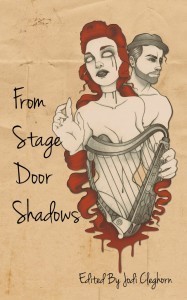 Just a reminder that there are free stories! The publisher, eMergent Publishing, will make each of the stories free for 48 hours, putting them up one per hour over the next two days. At time of writing, three are up already.
Just a reminder that there are free stories! The publisher, eMergent Publishing, will make each of the stories free for 48 hours, putting them up one per hour over the next two days. At time of writing, three are up already.
Check out this page for the complete schedule.
And this is the page where the stories will appear.
My own story from this anthology, “Rite of Spring”, will be available tomorrow.
And, if you want the whole collection in one print or ebook edition, you can buy it from eMergent.
September 22, 2012
‘The Next Big Thing’ Meme

Aaaarghhh! Tagged! I usually avoid these meme things like the plague they are, but when Meryl asks, how can a guy say no? Also, she caught me just after I’d finished revising my latest novel, and I’m dying to tell people about it.
What is the working title of your novel?
Heaven is a Place on Earth.
Where did the idea come from for the novel?
Years ago – maybe 20 years ago – I began writing a book about about a world in which people spent most of their lives in virtual reality and the rest in augmented reality. It’s an idea that has fascinated me much longer than that. I wrote a chapter and some notes and put it aside. Shortly afterwards Greg Egan’s Permutation City came out and my own ideas seemed paltry by comparison. So it stayed in the drawer. A few years later, “The Matrix” came out and, while I thought that was just a silly piece of fluff by comparison to Egan’s deeply thoughtful work, I reckoned the VR worlds market was officially saturated at that point.
However, I’ve always liked the world I built for that story and kept going back there in my mind. Just how will things work out as we spend more and more time in VR and we augment reality to ever increasing levels? In particular, the problem of how easy deception becomes in such a world came to dominate my ponderings. Back in 1986, I’d read a scientific paper on the possibility of animated ‘user agents’ (fake people) to help with using computers and it sent a chill up my spine. When these agents became real enough to fool people, how could we trust anything we ever saw again?
Another influence on the book was my own desire to write a novel that deals more deeply with my characters’ motivations and personalities than in the previous couple of books I’d done, which were both action-adventure stories. The original plot for this story too was action-adventure, so I ditched it, kept the ‘world’ and focused on the characters, with a new, less energetic plot.
What genre does your book fall under?
Definitely science fiction. Hard science fiction.
Which actors would you choose to play your characters in a movie rendition?
Not really a problem, I’d guess. This book is far less ‘filmic’ than most of the ones I write. The protagonist is a rather ordinary Australian woman – so I’m afraid Scarlett Johanssen is definitely out. I can see Asher Keddie in the part, or maybe a dark-haired thirty-something Naomi Watts if she put on some weight and didn’t wear makeup..
What is the one-sentence synopsis of your book?
When Ginny agrees to do a small favour for a friend, it sets her on a downward spiral into fear and confusion as reality itself begins to unravel.
Will your book be self-published or represented by an agency?
All my books are represented by an agency.
How long did it take you to write the first draft of your manuscript?
After a 20-year gestation, when I actually sat down to write it, it took five months. I think this is the shortest time I’ve ever taken to write a novel. Of course, those twenty years of cogitation might have helped.
What other books would you compare this story to within your genre?
Alastair Reynolds recently published a space opera in which there was a pervasive augmented reality. I read it when I was about half-way through writing “Heaven” and, fortunately, it’s a very different book with very different ideas – or mine might have had to go back into the drawer again. “Heaven” is possibly best described as a political thriller – an Australian sci-fi “Enemy of the State” or “Pelican Brief”, perhaps. I read a lot of Robert Goddard mysteries and his work was definitely an influence on how this book was structured.
Who or What inspired you to write this book?
If I had to pick one single incident, it would be reading that 1986 scientific paper. It gave me a glimpse into a disturbing future that has slowly been unfolding ever since.
What else about your book might pique the reader’s interest?
For Australians, it might be nice to see a sci-fi thriller set in their own country for a change (it moves from Brisbane to Sydney, Melbourne and Canberra with a quick excursion to a rural town not unlike the one I live near). For sci-fi and fantasy fans, they’ll see a number of references to famous works and tropes, and there is a distinct Wizard of Oz theme going on. Virtual Reality is such a liberating world for the sci-fi writer. If you want breakfast in outer space, a stroll in the Enchanted Forest, a chat with Odin in Asgard, and dinner in a bygone version of Paris, it is all possible – without upsetting Einstein.
And now to pass the baton. I hereby tag Emma, Sheila, and Joyce. Meme on, ladies.
September 6, 2012
This and That

Yes, an inconsequential post. A mere update. The kind of thing for which the weblog was invented, but whose current home is on Facebook and Twitter where ideas are few and gibber rules the roost. But I’m in a nostalgical state of whimsy and the urge to talk trivia is upon me.
Why this mood, you may ask (the three of you who have read this far). Maybe I’ve just caught Convention Fever and can’t say anything that isn’t giddy and vacuous. Maybe it’s because I’ve had a couple of crap days and need to go outside and skip in the sunshine (metaphorically and physically) to revive my spirits. Maybe it’s because I’ve just finished writing one book and I’ve just started a new writing project that I’ve been thinking about and planning for more than two years – the sequel to TimeSplash. Maybe it’s just lack of sleep. So, here’s some stuff.
I came across this in a Reuters piece on the Republican Convention:
Massachusetts U.S. Senate candidate and former consumer crusader Elizabeth Warren gave an impassioned attack against corporate greed. She criticized [Mitt] Romney’s statement that “corporations are people.”
“No, Governor Romney, corporations are not people,” Warren said. “People have hearts, they have kids, they get jobs, they get sick, they cry, they dance. They live, they love, and they die. And that matters.”
If anyone from Massachusetts is reading, would you please let Ms Warren know I’d like to have her babies.
And what’s with all these Big 6 publishers starting up digital-only imprints? Now Harper Voyager is in on the act. If anyone gets to see a contract from these guys, I’d love to know what the royalty rate is. (I bet they don’t pay advances.) And I’d love to know what kind of rights they try to lock in (e.g. print). Does anybody have a good idea why this would be significantly better than self-publishing?
And then there’s my new kitten – Minsky. He’s beautiful. Disturbingly beautiful. No creature with balls should be so beautiful. And crazy, and fearless, and like all those guys from the Cirque du Soleil stuffed into a tiny Tonkinese fur suit and fed crystal meth. I’m still astonished that he crept up on me the other night and woke me up by biting my lower lip.
And I’m reading a load of self-published sci-fi ebooks at the moment (as well as a great collection of commercially published old SF short stories). The quality is very variable but the good ones are at least as good as most commercially published books I’ve been reading lately. It suggests to me that some good writers are not sending manuscripts to publishers any more. This must mean that the overall quality of the publishers’ slush piles is taking a nose dive. Yet maybe all the poor quality material that is also going straight to self-publishing instead of polluting the slush piles is evening things out (maybe even improving quality). If the publishers hadn’t laid off so many staff lately, it could have reduced workload at any rate. Any publishing insiders care to comment?
You should probably just sit down with your favourite feed reader and make the rest up yourselves. I promise you, it will be more fun in the long run.
September 4, 2012
From Stage Door Shadows Launch

 The latest anthology from eMergent Publishing is to be launched at Smiths Alternate Bookstore in Canberra at the Conflux 8 spec fic convention on 29th September. Called From Stage Door Shadows, it contains 26 stories from writers around the English-speaking world, each one based on a line from Elton John’s hit Tiny Dancer. The book will be available in paperback and ebook formats and contains my own short story Rite of Spring. I based the story on the line “But oh how it feels so real” – which might look like a bit of a challenge, but, in fact, it was just bursting with possibilities.
The latest anthology from eMergent Publishing is to be launched at Smiths Alternate Bookstore in Canberra at the Conflux 8 spec fic convention on 29th September. Called From Stage Door Shadows, it contains 26 stories from writers around the English-speaking world, each one based on a line from Elton John’s hit Tiny Dancer. The book will be available in paperback and ebook formats and contains my own short story Rite of Spring. I based the story on the line “But oh how it feels so real” – which might look like a bit of a challenge, but, in fact, it was just bursting with possibilities.
eMergent will do their usual thing for this new release in their Literary Mix Tapes series and make each of the stories available for free for 24 hours on their website starting at 9am (Australian East Coast time) on the launch date. I think mine is the 1st story in the book, so if you want a free peek at what I did with that line, tune in to the eMergent website within 24 hours of 9am on the 29th.
For those who have read my Placid Point collection, you might be interested to note that Rite of Spring is a new story in the Placid Point world. For those who have been following my blog since the year dot, you might also be keen to hear that fellow Orbiteers, Janette Dalgliesh and Joanna Anderton also have stories in the anthology (well, I think that’s pretty cool, anyway). I haven’t read everything that’s in there yet (can’t wait to get my copy), but there are some excellent writers and it promises to be a great read.
So, pop along to the eMergent Publishing bookstore and pre-order your copy asap. (If you buy a paper copy from eMergent you get a free ebook version thrown in.) It will also be available from all good book shops (and if it isn’t, feel free to ask them to get it in for you).



